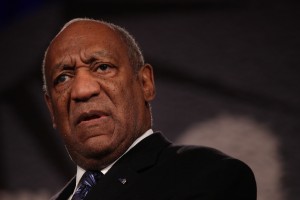
Bill Cosby (Photo by Spencer Platt/Getty)
I don’t know anything more about the Bill Cosby trial than what I’ve read in the media, but I do know that one of the worst moves you can make in a criminal trial when it’s really just a “he said/she said” case is to shift the focus away from the accuser and onto the accused. So Cosby (or his lawyers) made the right decision in not taking the stand.
The lion’s share of the evidence against Cosby comes from one person only, Andrea Constand, a former employee of Temple University who he met through his trustee work. She spent more than a day on the stand last week with defense attorneys exploiting each inconsistency in her testimony — what she said on the stand versus what she’d said happened in earlier depositions and police reports. They also delved into her past actions that they will argue are inconsistent with someone who was victim of sex assault. Chief among these: that she continued calling and seeing Cosby after the event (including bringing her parents to see him perform); that she did not report the incident immediately; that one year after the event she gave police reports that she later asked to edit to eliminate all indications of her enjoying her time with him.

How Legisway Helps In-House Teams Manage All Legal Matters In One Trusted Place
Operate with AI driven insights, legal intake, unified content and modular scalability to transform efficiency and clarity.
Her demeanor on the stand may also have turned some jurors off. According to news reports, she was placid, calm, cool, and collected. That, compared to the teary-eyed testimony of Kelly Johnson, another woman allegedly sexually assaulted by Cosby but not named as a victim in this case, makes her look like cold.
The prosecution used an expert who testified that sexual assault victims often delay reporting sex crimes when they know the person who assaulted them (with strangers, reporting is often more immediate). The expert explained why victims might show no emotion during testimony (they’ve been traumatized), and why inconsistencies from early to later retellings of the same events are common (they’ve blocked things out of their minds).
These explanations, however, might cover too much ground. Experts opine that if the victim cries on the stand, she’s obviously telling the truth. On the other hand, if she’s stoic, it’s because the event hurt her so deeply, she’s repressed it. If the complainant reports the crime right away, experts say that means it really happened. If she delays reporting, that’s only because she was embarrassed and couldn’t bring herself to report it sooner. If her story is consistent in the retelling, the event must have happened. If it’s not consistent, that’s because people in traumatic situations forget details. Everything is the hallmark of truth. Whatever the presentation of the alleged victim, the expert can rationalize it. The prosecutor gets to have his cake and eat it, too.
But no matter what the experts say, only one thing in these cases is key — the testimony of the victim. By keeping the focus on the victim alone, it assures that the jurors judge only that person’s credibility and not the defendant’s. It also reinforces the key precept of criminal law: the burden of proof is always only on the prosecutor. It basically tells them, “Jurors, don’t shift your eyes for even a second to that man sitting at the defense table. If this woman’s testimony alone can’t convince you that Bill Cosby sexually assaulted her, then you must acquit. If you’re uncertain the event happened as she testified, that’s a reasonable doubt. If you think the crime could have happened and even probably did happen, that’s still not enough to convict when the standard is proof beyond a reasonable doubt.”

Why Your Practice Is Burning Money And How You Can Do Better
Our expert panel explores common sources of profit leakage along with practical steps for improvement.
If Cosby’s defense attorneys hit hard during voir dire on the burden of proof, on the defendant’s right to the presumption of innocence and on how absolutely nothing can be assumed against the defendant if he chooses not to testify, there was no reason for Cosby to testify. All the prosecution has here is the word of one complainant, statements from civil depositions Cosby gave years ago, and the report of another alleged victim who wasn’t taken seriously enough for prosecutors to even include in the criminal action. What they’re missing are forensics, a prompt outcry, a consistent retelling of the event and the absence of any motive to lie (with any rich defendant, there’s always deep pockets that a complainant, defense attorneys will argue, would like to access.)
The last thing Cosby needs is the jurors comparing Constand’s story to what he might say on the stand. He’s already dug a hole for himself with his admission in civil depositions that he’s given women quaaludes. Any further testimony would only dig that hole deeper.
Putting any defendant on the stand, even one as well-seasoned in front of an audience as Bill Cosby, is a risk. One misstep, whether it be a hesitation in an answer, an off-hand smirk, an inconsistency or a joke that falls flat, and suddenly the burden of proof shifts from the prosecution to the defense. If jurors decide he’s hiding something — he’s too glib, too sure of himself, or not sure enough — they’ll find him guilty.
Because he didn’t take the stand, whatever goodwill might still exist for Cosby based on his many years as a beloved television performer and stand-up comic will still be in the jurors’ minds when they deliberate.
Had he taken the stand, anything and everything could have gone wrong for him.
Toni Messina has tried over 100 cases and has been practicing criminal law and immigration since 1990. You can follow her on Twitter: @tonitamess.